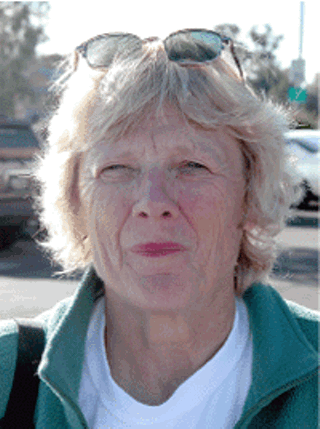Tell me about SOLPAE and CAADP.
SOLPAE was organized primarily to change legislation; it's a 501(c)4, so donations aren't tax-deductible. Then we realized that change was going to take a little while, and we organized the Coalition of Arizonans to Abolish the Death Penalty. Its primary purpose is education. The two groups collaborate, and some people are on both of the boards, but they have different boards.
The 1,000th execution has received a lot of attention--CAADP held the two vigils, and the execution was the top story on CNN.com for a while. But 1,000 is just a number; what's the real significance?
It is just a number, but even though 1,000 is just a number, it's also a human life. I think that's significant. It's significant that the polls I've been reading show support for the death penalty is falling, and the number of executions is dropping. There haven't been any executions in Arizona since Janet Napolitano became governor. When she was attorney general ... Napolitano (and her Capital Case Commission) came up with a lot of flaws that needed to be fixed. I think it's significant that ... Japan's rethinking it. China's rethinking it. ... My own reason for being against it is that it's ludicrous to think that we solve things with violence, with killing.
I have several "devil's advocate" questions for you: It's been almost three decades since the death penalty's reinstitution, and this is 1,000 people--many of them very, very bad people--who have died. We have 2,100 American troops dead in Iraq in three years, and thousands dying on the roadways every year. Why are these 1,000 lives a big deal?
Well, I think our morality and our politics, it all starts at the local level. It springs from the family to the community, to the state, to the nation. How we treat one another, and how we respond to the things that happen to us, are as much of a statement about ourselves as anything. ... There are a variety of reasons why other countries have ended the death penalty. ... It's not like killings are going to stop more killings. We have to ask ourselves: Why are we doing this? You walk down the halls of death row and look into the cells, and the people there have been marginalized, for the most part, their entire lives.
Some say that some killers are so bad, that the world would be better off if they were gone--that even having them around other people in prison can have a negative effect.
I think there are some people who are not going to change, because they're so injured in whatever ways they might be injured. As a psychologist, I want to know what we can learn from them. Second ... internationally, people are finding ways to segregate people who need to be segregated. ... There are ways. We have prisons that a mouse couldn't escape from.
What do you hope vigils, like the ones CAADP held last week, will accomplish?
Basically, we want to remind people what's going on, to raise awareness, and to remind ourselves, to renew our own energy to change these laws. I think many of us stand there in honor of life, to remember the lives taken at the hands of criminals, and also to remember that the criminal has life.
What do you see happening with the death penalty?
I expect we are going to end the death penalty in this state and in this country, but even then, the work won't be done. ... There's always an issue that's going to arouse anger and cries for retribution. After a horrible crime in the United Kingdom, people start clamoring for the death penalty. Jeffrey Dahmer, people thought he should have been executed (but Wisconsin doesn't have capital punishment). ... The visceral reaction's always going to be for vengeance. It's part of the human condition.





